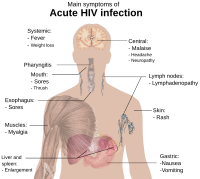
It's Time to View Severe Medically Unexplained Symptoms as Red-Flag Symptoms of Depression and Anxiety.
Sign Up to like & getrecommendations! Published in 2020 at "JAMA network open"
DOI: 10.1001/jamanetworkopen.2020.11520
Abstract: The study by Saunders and colleagues1 in JAMA Network Open is an important contribution to the field of what I’ll call medically unexplained symptoms (MUSs). MUSs in their most severe form encompass what the authors… read more here.
Keywords: medicine; medically unexplained; mus; health ... See more keywords

Estimated prevalence of medically unexplained physical symptoms in the medicine outpatient department of a tertiary care hospital in India.
Sign Up to like & getrecommendations! Published in 2019 at "General hospital psychiatry"
DOI: 10.1016/j.genhosppsych.2019.10.006
Abstract: PURPOSE There is a paucity of scientific evidence from the Indian subcontinent regarding the magnitude and burden of Medically Unexplained Physical Symptoms (MUPS). This study aims to fill the evidence gap by assessing the prevalence… read more here.
Keywords: physical symptoms; medicine; prevalence; medically unexplained ... See more keywords

No moderating impact of a medically unexplained etiology on the relationship between psychological profile and chronic pain.
Sign Up to like & getrecommendations! Published in 2018 at "Journal of psychosomatic research"
DOI: 10.1016/j.jpsychores.2018.10.017
Abstract: OBJECTIVES The objective of the present study was to test the moderating impact of an unknown pain etiology on the relationship between psychological factors and chronic pain intensity and disability. METHODS N = 471 chronic pain sufferers… read more here.
Keywords: etiology; relationship psychological; medically unexplained; chronic pain ... See more keywords

Barriers and facilitators to the implementation of interventions for medically unexplained symptoms in primary care: A modified Delphi study.
Sign Up to like & getrecommendations! Published in 2021 at "Journal of psychosomatic research"
DOI: 10.1016/j.jpsychores.2021.110386
Abstract: OBJECTIVE Medically Unexplained Symptoms (MUS) are physical symptoms that last for longer than several weeks and for which no (sufficient) somatic explanation can be found. Interventions for treating MUS in primary care are available, but… read more here.
Keywords: primary care; study; facilitators implementation; medically unexplained ... See more keywords

Psychotherapy for Medically Unexplained Pain: A Randomized Clinical Trial Comparing Intensive Short-Term Dynamic Psychotherapy and Cognitive-Behavior Therapy.
Sign Up to like & getrecommendations! Published in 2017 at "Psychosomatics"
DOI: 10.1016/j.psym.2017.01.003
Abstract: BACKGROUND The efficacy of intensive short-term dynamic psychotherapy (ISTDP) for medically unexplained pain remains open to debate because of a paucity of high-quality studies. OBJECTIVES This study sought to evaluate ISTDP as a treatment for… read more here.
Keywords: unexplained pain; pain; medically unexplained; intensive short ... See more keywords

Sociodemographic Characterization and Psychiatric Symptoms of Patients With Medically Unexplained Symptoms in a Healthcare Institution in Medellin (Colombia).
Sign Up to like & getrecommendations! Published in 2019 at "Revista colombiana de psiquiatria"
DOI: 10.1016/j.rcp.2017.08.005
Abstract: INTRODUCTION Medically unexplained symptoms are defined as physical symptoms that have been present for several weeks and that an adequate medical evaluation has not revealed any disease that explains them; when these symptoms become persistent,… read more here.
Keywords: symptoms patients; characterization psychiatric; medically unexplained; sociodemographic characterization ... See more keywords

Common therapeutic strategies in psychological treatments for medically unexplained somatic symptoms
Sign Up to like & getrecommendations! Published in 2019 at "Psychotherapy Research"
DOI: 10.1080/10503307.2019.1645370
Abstract: Abstract Objective: Medically unexplained somatic symptoms (MUSS) represent a frequent complaint in health care services. While psychological treatments have demonstrated some effect in patients with MUSS, further progress may be achieved by a synthesis of… read more here.
Keywords: somatic symptoms; medically unexplained; common therapeutic; patients muss ... See more keywords

Interventions for medically unexplained symptoms in the emergency department: a critical literature review
Sign Up to like & getrecommendations! Published in 2019 at "European Journal of Emergency Medicine"
DOI: 10.1097/mej.0000000000000613
Abstract: Medically unexplained symptoms, defined as physical symptoms for which no organic pathology can be found, represent 4% of all emergency department attendances annually. The standard management of these patients involves extensive investigation to rule out… read more here.
Keywords: pathology; emergency; medically unexplained; unexplained symptoms ... See more keywords

Do Cutibacterium acnes and Staphylococcus aureus define two different types of folliculitis?
Sign Up to like & getrecommendations! Published in 2018 at "Journal of the European Academy of Dermatology and Venereology"
DOI: 10.1111/jdv.14793
Abstract: scans are all unremarkable. Her symptoms are real, but she has no disease as understood from a biological construct. We all know how difficult these patients are to treat and how daunting it can be… read more here.
Keywords: neurology; dermatology; cardiology; medically unexplained ... See more keywords

Prevalence, types and associations of medically unexplained symptoms and signs. A cross‐sectional study of 1023 adults with intellectual disabilities
Sign Up to like & getrecommendations! Published in 2017 at "Journal of Intellectual Disability Research"
DOI: 10.1111/jir.12372
Abstract: BACKGROUND Medically unexplained symptoms and signs are common in the general population and can respond to appropriate managements. We aimed to quantify the types and prevalence of unexplained symptoms and signs experienced by adults with… read more here.
Keywords: symptoms signs; general population; medically unexplained; unexplained symptoms ... See more keywords

Improving teaching about medically unexplained symptoms for newly qualified doctors in the UK: findings from a questionnaire survey and expert workshop
Sign Up to like & getrecommendations! Published in 2017 at "BMJ Open"
DOI: 10.1136/bmjopen-2016-014720
Abstract: Objectives Medically unexplained symptoms (MUS) present frequently in healthcare, can be complex and frustrating for clinicians and patients and are often associated with overinvestigation and significant costs. Doctors need to be aware of appropriate management… read more here.
Keywords: workshop; foundation; medically unexplained; newly qualified ... See more keywords